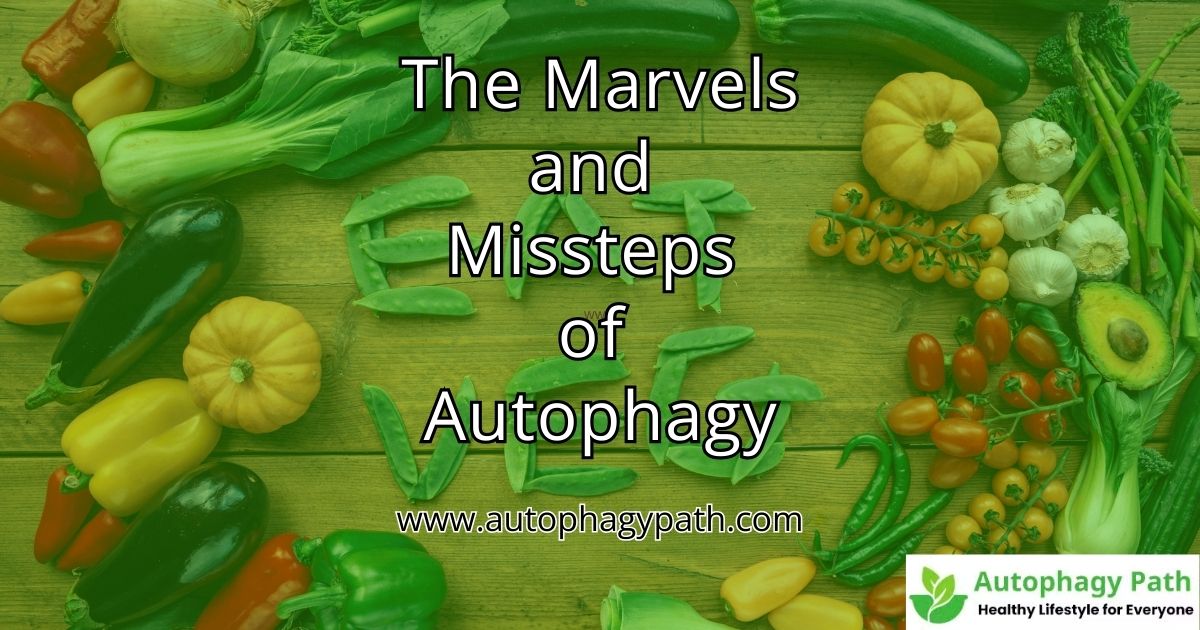Autophagy Definition, Process, Fasting & Signs
Autophagy Definition, Process, Fasting & Signs is a vital cellular process in maintaining cell health and function. Derived from the Greek, it means self-eating.
Autophagy Definition, Process, Fasting & Signs

The Cellular Housekeeping Process
Autophagy involves the degradation and recycling of cellular components. This process helps cells remove damaged organelles, misfolded proteins, and pathogens, ensuring cellular renewal and homeostasis.
Table of Contents
The Process of Autophagy
Autophagy is a highly regulated process that can have several steps:
Initiation: The process begins with a phagophore, a double-membrane structure that engulfs the targeted cellular components.
Nucleation and Expansion: The phagophore expands and encloses the material, forming an autophagosome.
Fusion with Lysosome: The autophagosome then fuses with a lysosome that contains digestive enzymes.
Degradation: The lysosomal enzymes break down the autophagosomal contents into molecules, which can by the cell.
This process is essential for cellular health, especially stress or nutrient deprivation, where the cell can break down its components to generate energy and essential molecules to induce autophagy.
Autophagy and Fasting
The traditional wisdom of fasting is one of the best ways that plays a vital role in inducing autophagy. When the body experiences nutrient deprivation, it triggers autophagy to maintain cellular function by recycling old and damaged cellular components. Here is how fasting influences autophagy:
Nutrient Sensing Pathways: During fasting, nutrient-sensing pathways such as the mTOR (mechanistic target of rapamycin) pathway get inhibited. This inhibition activates autophagy.
Energy Production: Fasting glucose levels prompt the body to use stored fats and proteins for energy. Autophagy plays an essential role in this energy production by breaking down cellular components.
Cellular Repair: The process also promotes cellular repair mechanisms, enhancing the body’s ability to recover from damage and stress.
Benefits of Autophagy
The benefits of autophagy extend across various aspects of health and disease prevention:
Neuroprotection: Autophagy helps protein aggregates and damaged mitochondria in neurons, reducing the risk of neurodegenerative diseases such as Alzheimer’s and Parkinson’s.
Cancer Prevention: Removing damaged cellular compounds autophagy activity reduces the likelihood of mutations and cancer development. However, in established cancers, the role of autophagy can be complex and context-dependent.
Metabolic Health: Autophagy improves insulin sensitivity and reduces inflammation, playing a role in preventing metabolic disorders such as diabetes and obesity.
Longevity: Studies in model organisms suggest that enhanced autophagy can extend lifespan by promoting cellular maintenance and reducing age-related damage.
Signs of Autophagy Activation
Recognizing the signs of autophagy can be challenging, as the process occurs at the cellular level. However, there are some indirect indicators that autophagy might be active:
Increased Ketone Levels: During fasting or low-carbohydrate diets, the body produces ketones as an alternative energy source, which can signal autophagy.
Reduced Inflammation: As autophagy helps clear damaged cells and proteins, it can reduce inflammation and associated symptoms.
Improved Metabolic Markers: Enhance autophagy by better blood sugar control and lipid profiles.
Increased Energy Levels: Many people report feeling more energetic and mentally clear during fasting or carbohydrate restriction, possibly due to the benefits of autophagy.

Autophagy in the Indian Context
Autophagy is a concept that resonates well with traditional Indian practices, such as intermittent fasting and dietary moderation. Practices like Upavasa (fasting) and Ayurvedic guidelines have long emphasized giving the digestive system a break and promoting cellular health.
Cultural Practices: Fasting is across various Indian religions and cultures. For instance, Hindus observe fasting during festivals like Navratri and Ekadashi, while Muslims practice fasting during Ramadan. These cultural practices align with modern scientific understanding of the benefits of autophagy.
Ayurvedic Perspectives: Ayurveda is the ancient Indian system of medicine for practices that promote detoxification and cellular rejuvenation, which align with the principles of autophagy. Ayurvedic recommendations like seasonal detoxification, specific herbs, and dietary adjustments aim to enhance the natural repair mechanisms.
Modern Lifestyle Adaptation: In fast-paced urban life, integrating fasting and autophagy-promoting practices can be challenging but highly beneficial. Incorporating short-term fasts, mindful eating, and regular physical activity can help urban Indians reap the benefits of autophagy without drastic lifestyle changes.
Practical Tips for Enhancing Autophagy
Here are some practical tips to naturally enhance autophagy in daily life:
Intermittent Fasting: Adopting intermittent fasting routines, such as the 16/8 method (fasting for 16 hours and eating within an 8-hour window), can help stimulate autophagy.
Exercise: Regular physical activity, especially high-intensity interval training (HIIT), can boost autophagy by creating mild cellular stress.
Nutrient Modulation: Reducing the intake of carbohydrates and increasing healthy fats can promote a state of ketosis, which enhances autophagy.
Caloric Restriction: Mild caloric restriction without malnutrition has to extend lifespan and promote autophagy.
Sleep: Ensuring adequate and quality sleep is crucial, as autophagy processes are active during rest periods.
Potential Risks and Considerations
While autophagy has many benefits, it is essential to approach it with balance and caution:
Over-Fasting: Prolonged or excessive fasting can lead to malnutrition, muscle loss, and other health issues. Balance your diet and consult healthcare professionals when considering extended fasting.
Individual Differences: People have varying metabolic rates, nutritional needs, and health conditions. The procedure that is suitable for one may not be the appropriate right fit for another. Personalized approaches are crucial to fast for autophagy.
Medical Conditions: Individuals with certain medical conditions, such as diabetes, eating disorders, or severe chronic illnesses, should seek medical advice before attempting fasting or drastic dietary changes.
Deep Dive into Autophagy and Its Benefits
Autophagy, the process of cellular self-cleaning, continues to garner attention for its myriad benefits, ranging from cellular renewal to improved mitochondrial health. By embracing strategies like intermittent fasting, the ketogenic diet, and moderate exercise, we can harness autophagy to promote overall health and longevity.
The Role of Diet in Autophagy
Intermittent Fasting and Ketogenic Diet: The 16/8 intermittent fasting method, where one fasts for 16 hours and eats during an 8-hour window, is particularly effective in stimulating autophagy. This fasting regimen reduces insulin levels and triggers the metabolic switch to ketosis, where fat becomes the primary energy source instead of glucose. During ketosis, the body breaks down fat into ketones, which fuel energy production and support autophagy. The ketogenic diet, rich in healthy fats and low in carbohydrates, also promotes ketosis, enhancing autophagy and contributing to mitochondrial health and cellular renewal.
Nutrient-Dense Foodstuff: Adopting a ketogenic meal plan ensures the body gets ample nutrients while maintaining low carbohydrate intake. Foods like avocados, nuts, seeds, olive oil, and fatty fish are staples in a keto diet, providing the necessary fats to maintain ketosis. This foodstuff’s benefits include improved mental clarity and reduced risk of neurodegenerative diseases.
Exercise and Autophagy
Moderate Exercise: Engaging in exercise, such as brisk walking, cycling, or swimming, can significantly stimulate autophagy. Exercise creates mild stress on the body, prompting cells to activate autophagic processes to remove damaged components and support energy production. This cellular clean-up enhances overall health and aids in weight management.
Yoga: Yoga provides moderate exercise stress, improves flexibility, and promotes mental well-being. The mindful movements and breathing exercises in yoga support cellular renewal and help maintain a balanced metabolism, further stimulating autophagy.
Autophagy for Weight Loss and Longevity
Weight Loss Guide: Combining intermittent fasting, the ketogenic diet, and moderate exercise can be particularly effective. This approach promotes fat loss, enhances metabolic health, and supports autophagy. Insulin levels and encouraging fat as these practices help the body efficiently burn stored fat and improve overall body composition.
Longevity and Mitochondrial Health: Autophagy plays a crucial role in longevity by maintaining mitochondrial health. Mitochondria, the powerhouses of cells, are responsible for energy production. Regular activation of autophagy ensures that damaged mitochondria are degraded and replaced with new, healthy ones, enhancing cellular energy production and reducing the risk of age-related diseases. Studies have shown that animals with enhanced autophagy tend to live longer and healthier lives, indicating the potential for similar benefits in humans.
Neurological Benefits of Autophagy:
Autophagy is particularly important for brain health. It helps clear protein aggregates and damaged organelles that can accumulate in neurons, reducing the risk of neurodegenerative conditions like Alzheimer’s and Parkinson’s diseases. By promoting cellular clean-up and renewal, autophagy supports cognitive function, memory, and overall neurological health.
Practical Implementation of Autophagy-Promoting Practices
Combining Diet and Exercise: The ketogenic diet, intermittent fasting, and moderate exercise are essential. Starting with a 16/8 intermittent fasting routine can help the body adapt to periods of fasting without feeling overly deprived. Following a ketogenic meal plan to eat will ensure ketosis, supporting weight loss and autophagy.
Consistency and Balance: While it might be tempting to dive into strict fasting or intense exercise, it is required to maintain balance. Gradually increasing fasting durations, adopting a sustainable ketogenic diet, and incorporating regular moderate exercise will yield the best results without causing undue stress on the body.
Listening to Your Body: Paying attention to your signals is crucial. Response to diet and exercise varies how you feel. If you experience fatigue, dizziness, or other adverse effects, it might be necessary to modify your routine. Consulting with a healthcare provider or a nutritionist can provide personalized guidance tailored to your needs and goals.
Cultural Integration and Modern Lifestyle
Traditional Practices in Modern Context: For example, the practice of Upavasa, fasting on certain days, can be aligned with intermittent fasting principles. Similarly, Ayurvedic dietary recommendations can complement the ketogenic diet, emphasising whole, natural that promote cellular health.
Urban Adaptation: Finding time for these practices can be challenging. However, adjustments like planning meals, choosing nutrient-dense ketogenic foods, and incorporating short but effective exercise routines can make a significant difference. Urban Indians can benefit from these practices without drastic changes to their lifestyle.
Final Thoughts
Understanding and leveraging autophagy through intermittent fasting, the ketogenic diet, and moderate exercise offers a holistic approach to health. These practices support weight loss and metabolic health and promote longevity, neurological benefits, and overall well-being. By integrating traditional wisdom with modern science, individuals can create a balanced and sustainable approach to health that enhances both quality and longevity of life.
The key to success lies in these practices. Embracing autophagy as a natural and beneficial process can empower individuals to take control of their health, leading to a healthier, happier, and longer life.
Frequently Asked Questions
How do you tell if you are in autophagy?
You can tell if you are in autophagy by signs such as increased ketone levels, reduced inflammation, improved metabolic markers (like blood sugar and lipid profiles), and enhanced energy levels. These indications are indirect, as autophagy is a cellular process not easily observed.
How long does it take to initiate autophagy?
Autophagy typically starts after 16-24 hours of fasting. The exact time can vary based on individual metabolism and previous diet, with factors like exercise and carbohydrate restriction potentially accelerating the process.
What are the 5 stages of autophagy?
The five stages of autophagy are:
Initiation: Formation of a phagophore.
Nucleation: Expansion of the phagophore.
Maturation: Formation of autophagosome
Fusion: Autophagosome fuses with a lysosome.
Degradation: Lysosomal enzymes break down contents for recycling.
What happens when your body goes into autophagy?
When your body goes into autophagy, it breaks down and recycles damaged cells and components, clearing toxins and promoting cellular renewal. This process enhances metabolic efficiency, supports repair mechanisms, reduces inflammation, and can improve overall health and longevity.
Conclusion
Autophagy is a fascinating and essential cellular process that offers numerous health benefits, from enhanced metabolic health to protection against neurodegenerative diseases. Understanding and leveraging autophagy through fasting, exercise, and mindful eating can improve their health and well-being.
For the Indian populace, integrating traditional fasting practices with a modern scientific understanding of autophagy can offer a holistic approach to health. Embracing these practices in a balanced and informed manner can lead to significant health improvements, aligning ancient wisdom with contemporary.






